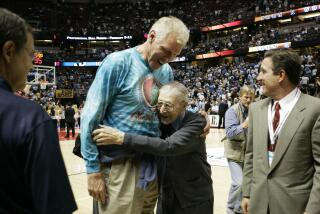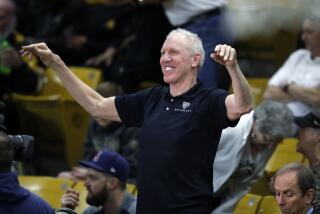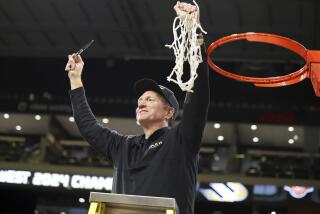He Won’t Be Stilled : After Almost Losing His Life When He Dived for a Basketball, Phil Sanson Tries to Recover His Voice While He Sustains Himself and Others With His Faith
- Share via
Lying on the table in the Marin General Hospital emergency room, Phil Sanson couldn’t breathe. His eyes wide with terror, he realized he had no way of telling the nurses he was suffocating.
His vocal cords were useless and his air passage was blocked by a fractured larynx, incurred when he dived out of bounds to save a loose ball in a basketball game between his The Master’s College team and Dominican College of San Rafael, Calif.
Fearing death, he prayed. Then, he slipped from consciousness.
Sanson didn’t know it, but he was being monitored and moments later, an incision was made in his larynx to open his air passage and a tube was inserted to facilitate breathing.
“There was a point there where it was a matter of minutes whether he’d live or die,” said Arthur Fenn, the surgeon who performed the operation on Jan. 9.
Later, Sanson was fitted for a larger tracheotomy tube. He could breathe with the tube, but he couldn’t speak.
Swelling and bleeding in the tissues of the larynx, including the vocal cords, prevented another operation until Feb. 12, when a San Francisco specialist, Herbert Dedo, inserted a device to keep the edges of Sanson’s vocal cords from scarring together and preventing sound and air from getting through. The keel, as it is called, was removed March 26, then reinserted May 28 because part of the area remained scarred.
The May 28 procedure, however, showed that Sanson’s dream that his voice can be fully restored can be a reality.
Late in June, he underwent his sixth in a series of operations and the keel was removed permanently. In late August, if the healing continues, he could have the tracheotomy tube removed and breathe on his own.
In the meantime, his voice is hoarse and his breathing is labored. He can talk by putting his finger on the hole of the tube to force air into his mouth.
Sanson’s future--a basketball tour with Athletes in Action and a career in the FBI--has been stalled since that January evening, but he doesn’t see what he could have done differently.
“It’s a normal reaction,” he said. “I saw (the ball) going out of bounds, and I thought I could save it.”
At top speed, the 6-foot-7, 210-pound senior forward crashed headfirst into the bleachers.
The replay in his mind has given him nightmares, yet he has no regrets about going for the ball.
“In the flow of the game, you don’t think about stuff like this,” Sanson said. “You don’t say, ‘I’ll go after this one, not this one.’ ”
Sanson’s competitive nature--when he woke from his operation he grabbed Fenn’s arm and mouthed: “Did we win?”--helps him deal with his injury.
He made up four weeks of schoolwork and graduated with his class in May, and he attended all of The Master’s practices and games after an initial recovery period in his hometown, Girard, Ill.
Never more alone with his thoughts than in the last six months, Sanson has wondered whether he will breathe on his own and regain full use of his voice.
A quietly religious young man when he enrolled two years ago at The Master’s in Santa Clarita, Sanson, 22, became a spokesman for his faith when he lost the ability to speak.
From his hospital bed, the day after the accident, he wrote: “I give thanks to the Lord for saving my life.”
His favorite Bible passage comes from Psalm 116:1: “I love the Lord because he has heard my voice. . . . “
For more than a month, no person heard Sanson’s voice.
Since then it has improved to a whisper, so quiet that even when he felt passionate about issues in his contemporary American politics class, he often remained silent because he realized it would take too much time and energy to express himself.
On other occasions, he hurriedly jotted down a condensed viewpoint for classmate Andy Thompson to read to the class.
“Naturally, I’d get depressed and frustrated,” Sanson said. “It lasts for a while, and like anyone else, you try to find ways to deal with it.”
Sanson’s observations are usually latent.
“You learn to keep stuff inside you,” he said. “It’s hard for me, because I’ve always been loud and outspoken. That’s a big adjustment, losing the freedom to say whatever you want.”
Even the simplest messages became tiring and time consuming to jot down. “And you can’t express emotions on paper,” Sanson said.
Often, roommate Don Peters became his voice. A longtime friend and teammate, Peters understood Sanson’s hand motions and learned to read his lips. He handled all Sanson’s phone calls and relayed information between Phil and his friends.
On the bench at The Master’s games, Sanson needed no interpreter. He celebrated each dunk with a thrust of his fist and greeted his teammates with high-fives as they came off the floor for timeouts.
“He was an inspiration,” Peters said. “It’s amazing to see someone who’s not out there be a part of the team, like he’s on the floor.”
Afterward, Sanson’s body language told another story.
“A lot of times he was down after games,” Peters said. “It really hurt him not to be able to play.”
*
Sanson’s fervor for basketball was nurtured in Girard, a farming community of 2,400, about 35 miles southwest of Springfield.
In a town without a movie theater, shopping mall or fast-food outlet, Sanson was the star of the Girard High basketball team, the captain of the football team and a stock clerk at Cherry’s Country Store, the only grocery in town.
In 1989, he enrolled at Lincoln Land Community College in Springfield and played basketball for Coach Pat Smith, a disciplinarian who emphasized intensity, hustle and aggressive play.
One night after a defeat on the road, Smith told his players to ride the bus in their sweaty uniforms. Upon their return to campus, they practiced. During a lengthy loose-ball drill, Smith threw the ball near the out-of-bounds line, adjacent to a row of chairs. Sanson lunged out of bounds, batted the ball inbounds and scattered a row of chairs. Impressed, Smith ended the practice on the spot and Sanson earned the gratitude of his teammates.
During Sanson’s two seasons at Lincoln Land, all but a few players quit the team. Yet there was no question that Sanson would be among them.
“Phil’s a survivor,” said Peters, also a Lincoln Land alumnus. “He always has been.”
The years with Smith gave Peters and Sanson plenty of stories to tell in their dormitory room at The Master’s. They also talked about the simpler lives they left behind in Illinois farm country.
Peters, Sanson’s perennial backup, replaced him against Dominican and helped the Mustangs clinch an emotional 77-71 victory. He stayed in the starting lineup the rest of the season.
“I felt a big responsibility,” Peters said. “I owed him because he taught me so much. I mean, if he was willing to give his life for that ball, I should give 110%.”
*
Among the stack of get-well cards Sanson has received is one from a hockey player in Missouri who knew exactly what to say.
The youngster suffered a similar injury when a skate blade sliced his throat.
“It really touched my heart,” Sanson said. “You know, walking around, you never, never think about this. My doctor says he does these surgeries every day, but I’ve never seen someone else it happened to. It made me feel like I’m not all alone.”
The cards and support from his relatives, teammates, coaches and classmates enable Sanson to handle his frustrations.
He also relies on the counsel of team trainer Bill Vine, who read his mind in the hospital recovery room. Vine advised him to ask, “What can I do now?” instead of “Why me?”
“At times I just want to yell,” Sanson said. “But the good times outweigh the bad.”
More to Read
Sign up for Essential California
The most important California stories and recommendations in your inbox every morning.
You may occasionally receive promotional content from the Los Angeles Times.










